How to identify scams like the fake TotalEnergies email
Phishing/ScamAlso Known As: TotalEnergies phishing email
Get free scan and check if your device is infected.
Remove it nowTo use full-featured product, you have to purchase a license for Combo Cleaner. Seven days free trial available. Combo Cleaner is owned and operated by RCS LT, the parent company of PCRisk.com.
What is the fake letter from "TotalEnergies"?
We have inspected this email and found that it is a fraudulent letter masquerading as a request for the supply and delivery of products from TotalEnergies (a legitimate energy and petroleum company). Usually, scammers use such emails to extract personal information or money from recipients. Thus, this email should be ignored.
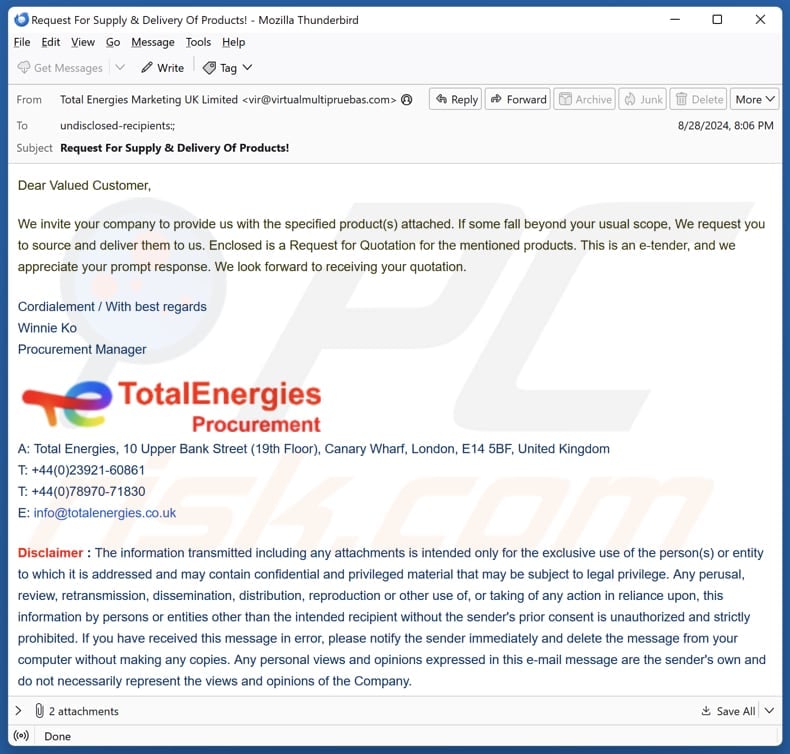
More about the "TotalEnergies" scam email
The scam email masquerades as a request from a procurement manager (supposedly Winnie Ko) at TotalEnergies. It encourages the recipient's company to provide specific products listed in an attached Request for Quotation. The email suggests that even if some products are outside the company's typical offerings, they should be sourced and delivered.
The files attached to this email are "Datasheet file.pdf" and "RFQ TotalEnergies Uk.pdf" (their names may vary). The "Datasheet file.pdf" file contains product details, and the other one is a fake request for quotation. Usually, scam emails of this type are utilized to trick recipients into sending scammers money or providing personal information.
The information scammers usually aim to extract includes credit card details, ID card information, social security numbers, or other details. When scammers seek to extract money, they often claim that individuals must pay some advance, administration, or other fees. Either way, it is important to recognize scam emails and never respond to them to avoid potential issues.
| Name | TotalEnergies Email Scam |
| Threat Type | Phishing, Scam, Social Engineering, Fraud |
| Fake Claim | The email contains a request for quotation and product list |
| Attachments | Datasheet file.pdf, RFQ TotalEnergies Uk.pdf |
| Detection Names (Datasheet file.pdf) | N/A (VirusTotal) |
| Detection Names (RFQ TotalEnergies Uk.pdf) | N/A (VirusTotal) |
| Disguise | Letter from TotalEnergies (company's procurement manager) |
| Symptoms | Unauthorized online purchases, changed online account passwords, identity theft, illegal access of the computer. |
| Distribution methods | Deceptive emails, rogue online pop-up ads, search engine poisoning techniques, misspelled domains. |
| Damage | Loss of sensitive private information, monetary loss, identity theft. |
| Malware Removal (Windows) |
To eliminate possible malware infections, scan your computer with legitimate antivirus software. Our security researchers recommend using Combo Cleaner. Download Combo CleanerTo use full-featured product, you have to purchase a license for Combo Cleaner. 7 days free trial available. Combo Cleaner is owned and operated by RCS LT, the parent company of PCRisk.com. |
Similar scam emails in general
Such emails often disguise themselves as legitimate business or other requests to deceive recipients into providing sensitive information or taking other action. Recipients should always verify the authenticity of unsolicited requests and avoid responding to or sharing information if emails lack legitimacy.
Some examples of scam emails are "Outlook Password Has Expired", "Luciano Pavarotti Testament", and "You Have A New Document". It is important to note that deceptive emails can be used to trick recipients into infecting their computers.
How do spam campaigns infect computers?
Threat actors use email to spread malware by sending harmful files or links. These attachments typically are malicious MS Office documents, PDFs, executable files, ISO images, or compressed archives. Infection occurs when users enable macros in malicious MS Office documents, run executable files, or perform other actions.
Links in deceptive emails may direct users to fake websites designed to deceive them into downloading infected files or software. These links can also lead to sites that automatically download malware.
How to avoid installation of malware?
Inspect emails before opening files or links in them. Be careful with suspicious (e.g., irrelevant, unexpected) emails from unknown addresses. Download software from official websites (or app stores). Avoid clicking advertisements, pop-ups, buttons, or links on shady pages. Regularly update your operating system, applications, and antivirus software.
Also, use a reputable security tool and scan your computer for threats on a regular basis. If you have already opened malicious attachments, we recommend running a scan with Combo Cleaner Antivirus for Windows to automatically eliminate infiltrated malware.
Text presented in the "TotalEnergies" email letter:
Subject: Request For Supply & Delivery Of Products!
Dear Valued Customer,
We invite your company to provide us with the specified product(s) attached. If some fall beyond your usual scope, We request you to source and deliver them to us. Enclosed is a Request for Quotation for the mentioned products. This is an e-tender, and we appreciate your prompt response. We look forward to receiving your quotation.
Cordialement / With best regards
Winnie Ko
Procurement ManagerTotalEnergies
ProcurementA: Total Energies, 10 Upper Bank Street (19th Floor), Canary Wharf, London, E14 5BF, United Kingdom
T: +44(0)23921-60861
T: +44(0)78970-71830
E: info@totalenergies.co.uk
The appearance of "RFQ TotalEnergies Uk.pdf" file (GIF):
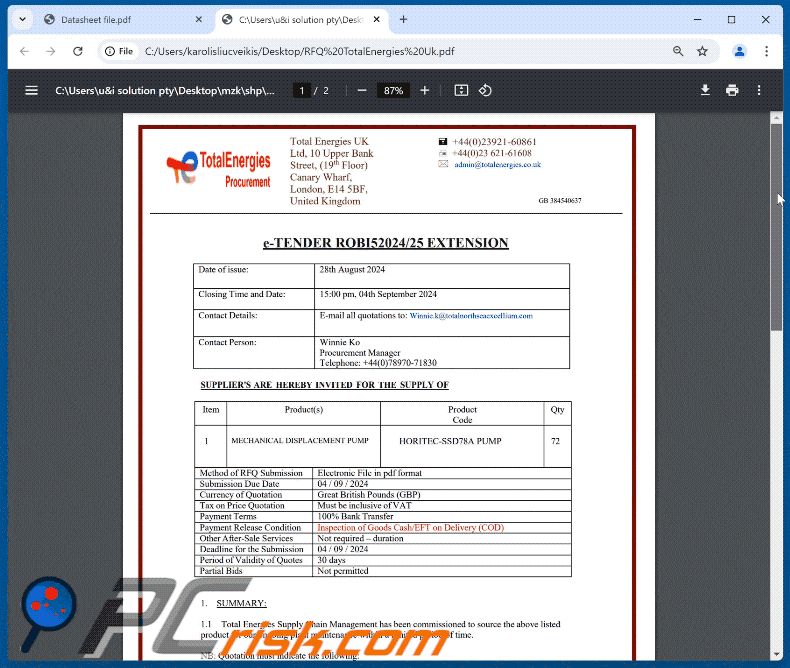
Screenshot of the "Datasheet file.pdf":
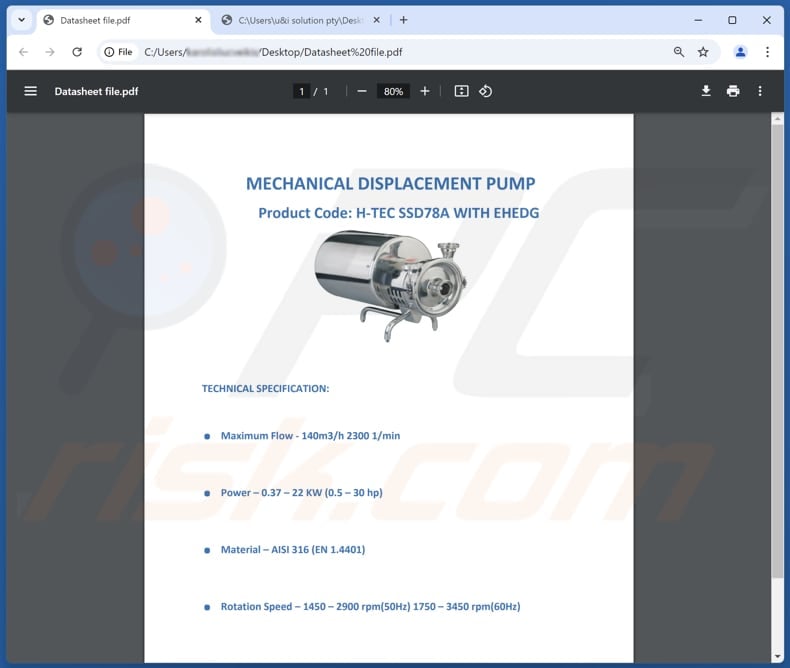
Other examples of TotalEnergies-themed spam emails:
Sample 1:
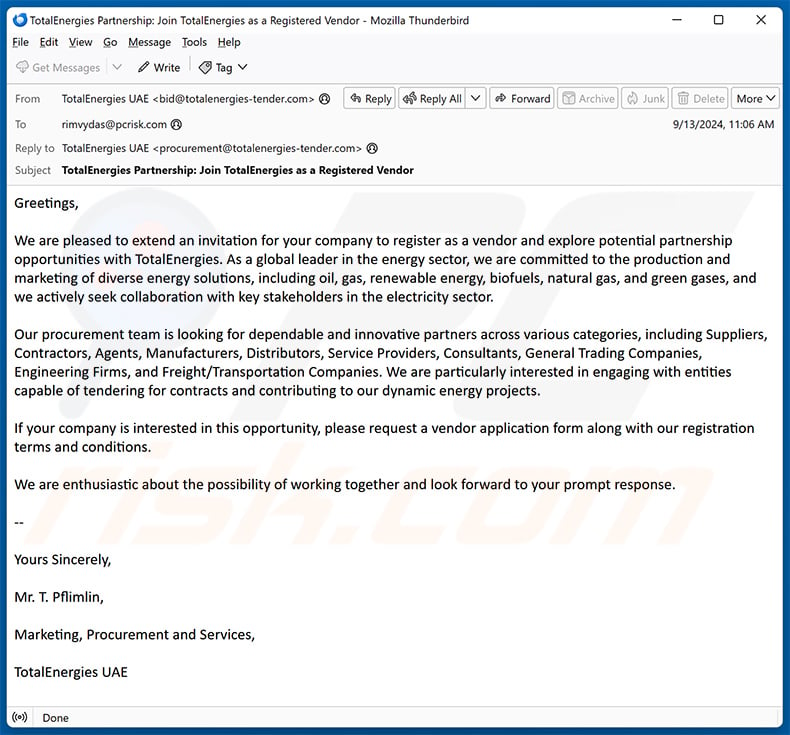
Text presented within:
Subject: TotalEnergies Partnership: Join TotalEnergies as a Registered Vendor
Greetings,We are pleased to extend an invitation for your company to register as a vendor and explore potential partnership opportunities with TotalEnergies. As a global leader in the energy sector, we are committed to the production and marketing of diverse energy solutions, including oil, gas, renewable energy, biofuels, natural gas, and green gases, and we actively seek collaboration with key stakeholders in the electricity sector.
Our procurement team is looking for dependable and innovative partners across various categories, including Suppliers, Contractors, Agents, Manufacturers, Distributors, Service Providers, Consultants, General Trading Companies, Engineering Firms, and Freight/Transportation Companies. We are particularly interested in engaging with entities capable of tendering for contracts and contributing to our dynamic energy projects.
If your company is interested in this opportunity, please request a vendor application form along with our registration terms and conditions.
We are enthusiastic about the possibility of working together and look forward to your prompt response.
--
Yours Sincerely,
Mr. T. Pflimlin,
Marketing, Procurement and Services,
TotalEnergies UAE
Sample 2:
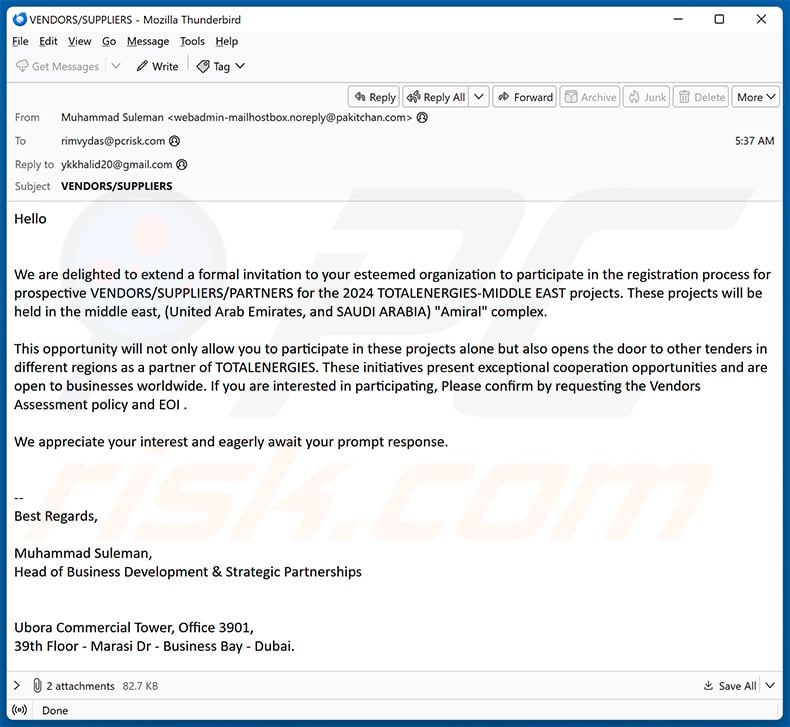
Text presented within:
Subject: VENDORS/SUPPLIERS
Hello
We are delighted to extend a formal invitation to your esteemed organization to participate in the registration process for prospective VENDORS/SUPPLIERS/PARTNERS for the 2024 TOTALENERGIES-MIDDLE EAST projects. These projects will be held in the middle east, (United Arab Emirates, and SAUDI ARABIA) "Amiral" complex.
This opportunity will not only allow you to participate in these projects alone but also opens the door to other tenders in different regions as a partner of TOTALENERGIES. These initiatives present exceptional cooperation opportunities and are open to businesses worldwide. If you are interested in participating, Please confirm by requesting the Vendors Assessment policy and EOI .
We appreciate your interest and eagerly await your prompt response.
--
Best Regards,Muhammad Suleman,
Head of Business Development & Strategic PartnershipsUbora Commercial Tower, Office 3901,
39th Floor - Marasi Dr - Business Bay - Dubai.
Screenshot of the attached PDF document:
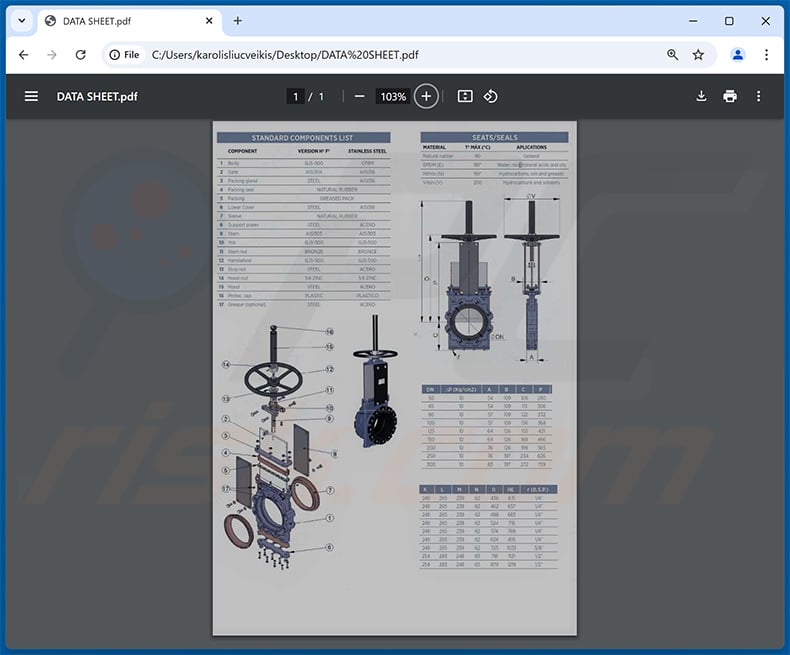
Screenshot of the attached MS Word document:
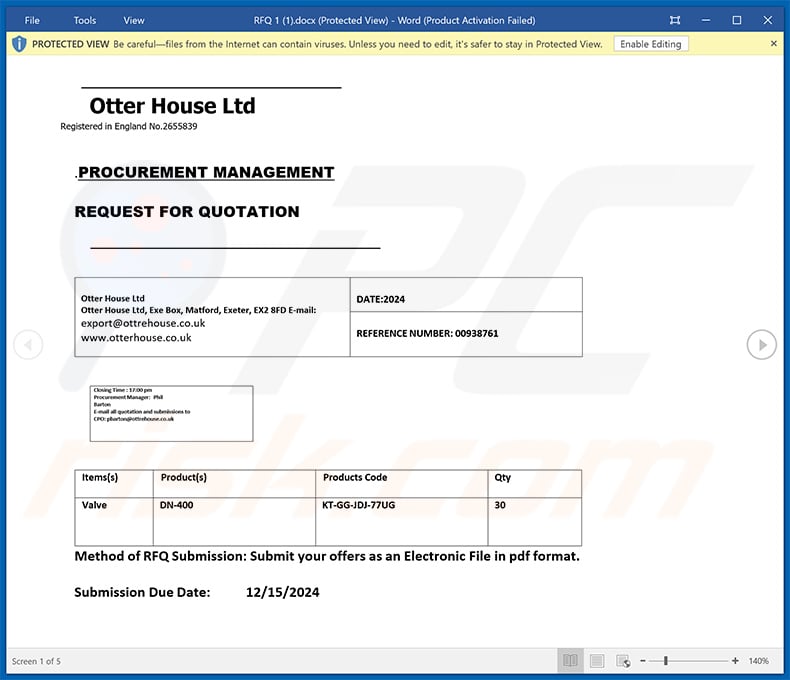
Sample 3:
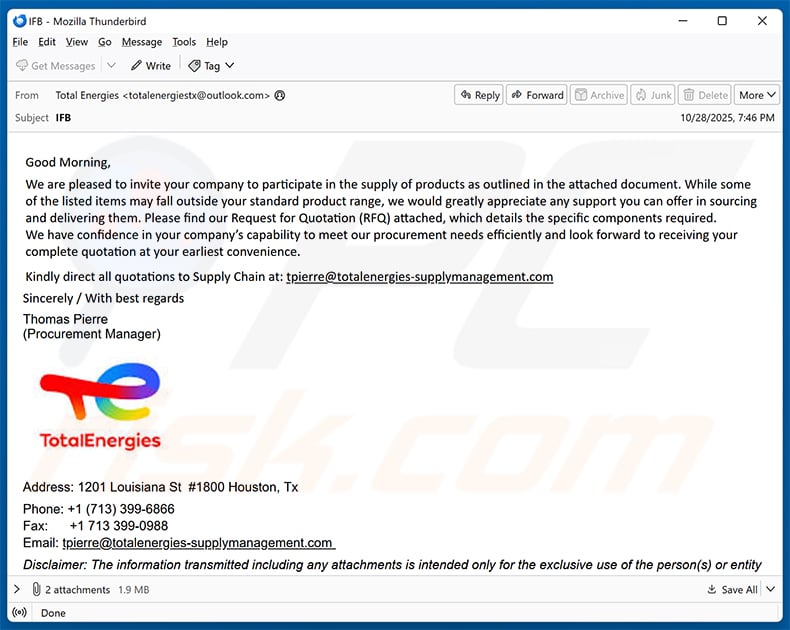
Text presented within:
Good Morning,
We are pleased to invite your company to participate in the supply of products as outlined in the attached document. While some of the listed items may fall outside your standard product range, we would greatly appreciate any support you can offer in sourcing and delivering them. Please find our Request for Quotation (RFQ) attached, which details the specific components required.
We have confidence in your company's capability to meet our procurement needs efficiently and look forward to receiving your complete quotation at your earliest convenience.
Kindly direct all quotations to Supply Chain at: tpierre@totalenergies-supplymanagement.com
Sincerely / With best regards
Thomas Pierre
(Procurement Manager)
TotalEnergies
Address: 1201 Louisiana St #1800 Houston, TxPhone: +1 (713) 399-6866
Fax: +1 713 399-0988
Email: tpierre@totalenergies-supplymanagement.com
Screenshot of the first attachment:
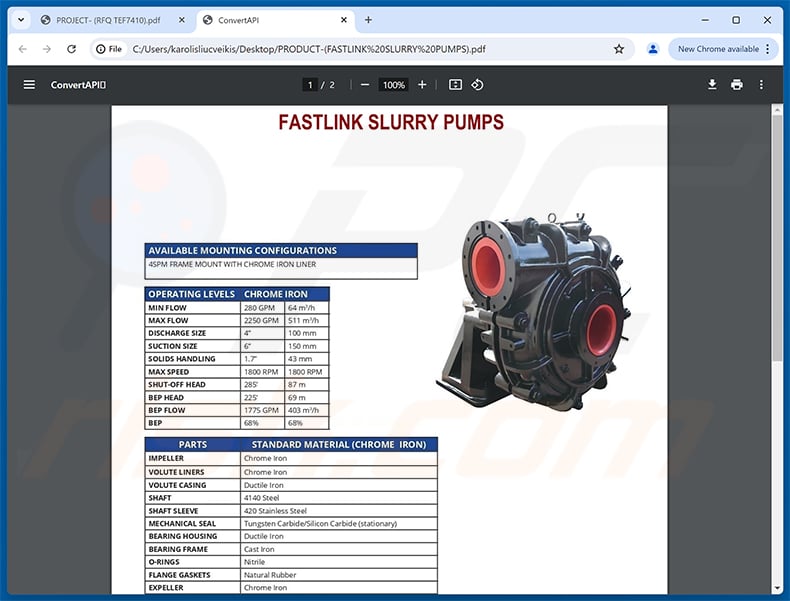
Screenshot of the second attachment:
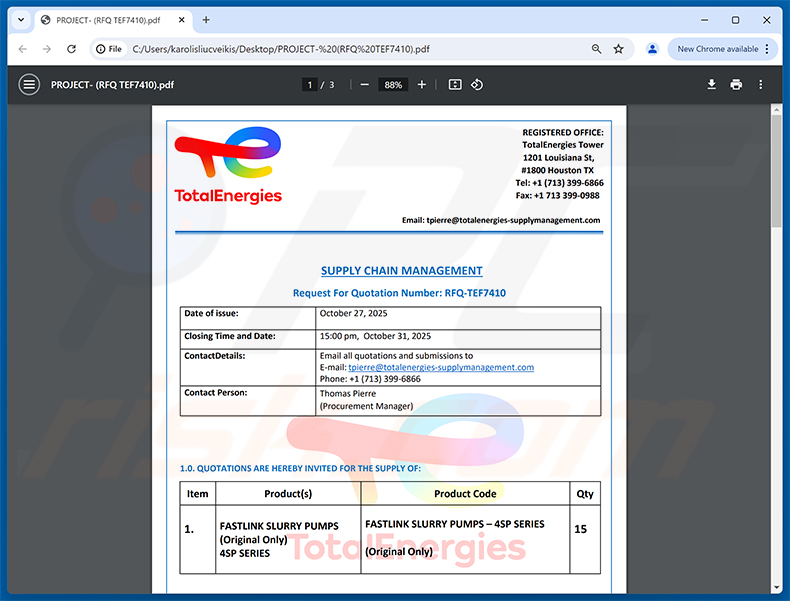
Instant automatic malware removal:
Manual threat removal might be a lengthy and complicated process that requires advanced IT skills. Combo Cleaner is a professional automatic malware removal tool that is recommended to get rid of malware. Download it by clicking the button below:
DOWNLOAD Combo CleanerBy downloading any software listed on this website you agree to our Privacy Policy and Terms of Use. To use full-featured product, you have to purchase a license for Combo Cleaner. 7 days free trial available. Combo Cleaner is owned and operated by RCS LT, the parent company of PCRisk.com.
Quick menu:
- What is TotalEnergies phishing email?
- Types of malicious emails.
- How to spot a malicious email?
- What to do if you fell for an email scam?
Types of malicious emails:
![]() Phishing Emails
Phishing Emails
Most commonly, cybercriminals use deceptive emails to trick Internet users into giving away their sensitive private information, for example, login information for various online services, email accounts, or online banking information.
Such attacks are called phishing. In a phishing attack, cybercriminals usually send an email message with some popular service logo (for example, Microsoft, DHL, Amazon, Netflix), create urgency (wrong shipping address, expired password, etc.), and place a link which they hope their potential victims will click on.
After clicking the link presented in such email message, victims are redirected to a fake website that looks identical or extremely similar to the original one. Victims are then asked to enter their password, credit card details, or some other information that gets stolen by cybercriminals.
![]() Emails with Malicious Attachments
Emails with Malicious Attachments
Another popular attack vector is email spam with malicious attachments that infect users' computers with malware. Malicious attachments usually carry trojans that are capable of stealing passwords, banking information, and other sensitive information.
In such attacks, cybercriminals' main goal is to trick their potential victims into opening an infected email attachment. To achieve this goal, email messages usually talk about recently received invoices, faxes, or voice messages.
If a potential victim falls for the lure and opens the attachment, their computers get infected, and cybercriminals can collect a lot of sensitive information.
While it's a more complicated method to steal personal information (spam filters and antivirus programs usually detect such attempts), if successful, cybercriminals can get a much wider array of data and can collect information for a long period of time.
![]() Sextortion Emails
Sextortion Emails
This is a type of phishing. In this case, users receive an email claiming that a cybercriminal could access the webcam of the potential victim and has a video recording of one's masturbation.
To get rid of the video, victims are asked to pay a ransom (usually using Bitcoin or another cryptocurrency). Nevertheless, all of these claims are false - users who receive such emails should ignore and delete them.
How to spot a malicious email?
While cyber criminals try to make their lure emails look trustworthy, here are some things that you should look for when trying to spot a phishing email:
- Check the sender's ("from") email address: Hover your mouse over the "from" address and check if it's legitimate. For example, if you received an email from Microsoft, be sure to check if the email address is @microsoft.com and not something suspicious like @m1crosoft.com, @microsfot.com, @account-security-noreply.com, etc.
- Check for generic greetings: If the greeting in the email is "Dear user", "Dear @youremail.com", "Dear valued customer", this should raise suspiciousness. Most commonly, companies call you by your name. Lack of this information could signal a phishing attempt.
- Check the links in the email: Hover your mouse over the link presented in the email, if the link that appears seems suspicious, don't click it. For example, if you received an email from Microsoft and the link in the email shows that it will go to firebasestorage.googleapis.com/v0... you shouldn't trust it. It's best not to click any links in the emails but to visit the company website that sent you the email in the first place.
- Don't blindly trust email attachments: Most commonly, legitimate companies will ask you to log in to their website and to view any documents there; if you received an email with an attachment, it's a good idea to scan it with an antivirus application. Infected email attachments are a common attack vector used by cybercriminals.
To minimise the risk of opening phishing and malicious emails we recommend using Combo Cleaner Antivirus for Windows.
Example of a spam email:

What to do if you fell for an email scam?
- If you clicked on a link in a phishing email and entered your password - be sure to change your password as soon as possible. Usually, cybercriminals collect stolen credentials and then sell them to other groups that use them for malicious purposes. If you change your password in a timely manner, there's a chance that criminals won't have enough time to do any damage.
- If you entered your credit card information - contact your bank as soon as possible and explain the situation. There's a good chance that you will need to cancel your compromised credit card and get a new one.
- If you see any signs of identity theft - you should immediately contact the Federal Trade Commission. This institution will collect information about your situation and create a personal recovery plan.
- If you opened a malicious attachment - your computer is probably infected, you should scan it with a reputable antivirus application. For this purpose, we recommend using Combo Cleaner Antivirus for Windows.
- Help other Internet users - report phishing emails to Anti-Phishing Working Group, FBI’s Internet Crime Complaint Center, National Fraud Information Center and U.S. Department of Justice.
Frequently Asked Questions (FAQ)
Why did I receive this email?
Scammers send their messages to numerous addresses indiscriminately. In essence, these emails are not personalized or targeted.
I have provided my personal information when tricked by this email, what should I do?
If you have shared account credentials, update your passwords immediately. For any personal information you may have disclosed, such as credit card or ID details, contact the appropriate authorities right away.
I have downloaded and opened a file attached to this email, is my computer infected?
The files attached to the email are not malicious. However, cybercriminals can send malicious files that can inject malware.
I have read the email but did not open the attachment, is my computer infected?
Opening an email itself is generally safe and poses no risk. The actual risk comes from clicking on links or opening attachments found in deceptive emails.
Will Combo Cleaner remove malware infections that were present in email attachment?
Yes, Combo Cleaner detects and eliminates nearly all known malware. However, advanced malware can conceal itself deeply within your system, so performing a full system scan is required to eliminate malware of this kind.
Share:

Tomas Meskauskas
Expert security researcher, professional malware analyst
I am passionate about computer security and technology. I have an experience of over 10 years working in various companies related to computer technical issue solving and Internet security. I have been working as an author and editor for pcrisk.com since 2010. Follow me on Twitter and LinkedIn to stay informed about the latest online security threats.
PCrisk security portal is brought by a company RCS LT.
Joined forces of security researchers help educate computer users about the latest online security threats. More information about the company RCS LT.
Our malware removal guides are free. However, if you want to support us you can send us a donation.
DonatePCrisk security portal is brought by a company RCS LT.
Joined forces of security researchers help educate computer users about the latest online security threats. More information about the company RCS LT.
Our malware removal guides are free. However, if you want to support us you can send us a donation.
Donate
▼ Show Discussion